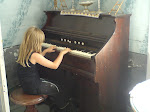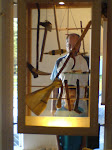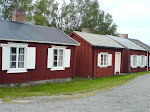

Astrid Lindgren left her enormous archive to the Royal Library (Kungliga biblioteket) in Stockholm, and this library contains 125 shelf-meters of manuscripts, letters, press cuttings etc. Most parts of it are letters (from the whole world) and press-cuttings. Unesco has given this archive the status of World-memory (translated directly from Swedish; corresponding to World heritages, which Ingmar Bergman’s and Alfred Nobel’s archives are suggested to be too), by this sanctioned that this archive is important to protect for human beings and the whole world. She and the Danish author H. C. Andersen are the only child book authors which are honoured in this way.
One of her admirers has said about her that she was “simple (or plain), brave, wise, kind, sees when the emperor doesn’t have any cloths – and points this out (talks about it)!”
She was 38 when she made her début as author and 68 when she made her début as political author.
Was she both Pippi and Ronia and Emil etc.? In one and the same person? My wonder…
Ronia the concretisation of the growing child’s rebellion, fear, sorrow, love and also strength. “Watch (Mind or look out for) the Hell’s Gap!”
they said to Ronia, to warn and protect (over-protect?). But then Ronia immediately rushes to it instead.
“How am I supposed to mind for the Hell’s Gap if I am not there?” she wonders.
A woman met Astrid Lindgren and overwhelmed over the situation she said:
“Oh, how wonderful, Astrid, to shake your hand!”
“Shake it again then!”
Astrid Lindgren replied!!
Her first child, Lasse (Lars) she bore in secret before she was twenty, he spent his first three years in a foster home in Copenhagen and one year with his maternal grandparents at Näs in Småland (see earlier blogposts about Lindgren with links to different places etc. connected to her including the farm she grew up on, Näs!).
Her marriage became short. When she was 44 her husband died and she lived the rest of her life as widow, never married again.
Already in February 1951 she participated in a radio program about “the single mother’s situation”. At that point few knew that she talked from own experiences. Her attitude was both then and later that the children should come in the first place, the child was always the most important, not the mother, how difficult her situation even was. She thought it was the children who had to suffer for the moralist’s sake.
At the same time she warned for generalisations and for romanticizing the motherhood. She thought a good foster home could in the specific case be better than a too young and immature mother.
And with an inimitable “lindgrenskian” turn she slightly bantered with how easy it seemed to be to take the guilt feeling away for “the extra-marital fatherhood”!!!
She also said to a friend:
“I can walk out on the street and look people directly in their eyes and then I can’t help thinking: ‘How do you have it, you poor thing?’ One can’t avoid wondering when one knows how people have it: ‘Is it really like this it is thought it shall be? (are those the intentions about life, the world, human beings lives?)’”
She also had her small thoughts when she watched the men in the park (Vasaparken) outside the windows to her apartment at Dalagatan in Stockholm, men who were alcoholics sitting on the benches there. She felt with them too.
In the aftermath of the tax-raid (round up) on Ingmar Bergman 1976 she wrote a letter to one of the responsible about this:
“I think the police shall treat whoever it concerns respectfully [no matter if it was famous person or not, and not treat the famous worse either!! My interpretation).”
She thought one should be careful going out to the press with things before anything was properly investigated, in this case if Bergman deliberately had committed any crimes concerning taxes or not. That people shouldn’t be given out officially only on suspicions.
“It’s like this it is; a judgment in court must have been pronounced first even when it is about the worse and biggest murderer in the whole world!
If he has done something that isn’t right, then of course he shall soot for this when the whole is proven. But don’t pick a human being to pieces as long it’s only about suspicions, a right even Ingmar Bergman should have, as you and me and all which lives in a law-governed society.”
One characteristic thing about her in all she engaged herself in is that global issues are mixed with local. She was a woman with intuition which reacted on “the concrete question at issue”, not an intellectually calculating person which on beforehand estimated in which circumstance her words would have largest or greatest possible effect. She reacted with her heart but also used the head when she was arguing for her cause.
She said to another woman:
“You feel in your stomach what’s right or wrong. Act on your gut feelings, trust them!”
And Astrid Lindgren also thought that it is only the grown up and calculating which start thinking in patterns like
“…on the one hand we shall… to… but on the other we can’t… because…”
A former Swedish politician Bengt Göransson says about her that she was always “common” (i.e., “as we all are”, she never took a position from above) in her appearances, never the great author which spoke to an ignorant public. She spoke from below, before the authority, which she says she had learnt both to obey and respect (??). Her usualness was also her strength he thinks.
Astrid Lindgren spoke about the libraries by informing how great they are for the children, and showed with a grimace that she thought that those who attacked the libraries are mean and stupid, that was enough (no more words than those!!). When she said what he thought she wasn’t the expert who spoke from above but she said what people in general thought. She never started a contribution to a debate with “We intellectuals…”
She also avoided the sunken rocks the populist always risk steering onto when he tries to interpret what people want. It’s simply so that Astrid Lindgren spoke about things she reacted on. She had a strong intuition and felt what was wrong. She reacted spontaneously and rapidly without dedicating herself to tactical considerations. That’s the reason why she so often hit the right thing, and when she captured a general opinion – “what people though” – she didn’t because she had stronger antennas than people in general, antennas which tells what people thinks, but she just said what she herself thought, frankly and directly.
Not only a great author but also a political person, let be with strong traits of the truth telling child in the Emperors New Cloths.
I guess she would have had a lot to react on today…
Photos above taken here today and on the grave yard taken yesterday, on the old church ruin there...





























Inga kommentarer:
Skicka en kommentar